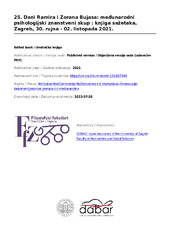Приказ основних података о документу
Ethnic identity delegitimization as a predictor of attitudes towards ethnic outgroups
| dc.creator | Ninković, Milica | |
| dc.date.accessioned | 2023-07-31T09:18:51Z | |
| dc.date.available | 2023-07-31T09:18:51Z | |
| dc.date.issued | 2021 | |
| dc.identifier.issn | 1849-6946 | |
| dc.identifier.uri | http://reff.f.bg.ac.rs/handle/123456789/4642 | |
| dc.description.abstract | Ethnic identity delegitimization (EIDL) is a general tendency to question or deny the existence of ethnic groups that have existed less long than one’s ingroup. It is based on a belief that ethnic identity derived from such groups is made up, i.e. that it is not a legitimate identity. EIDL is typically used in conservative (post-) conflict narratives to “prove” that the outgroup’s (OG) ethnic identity is less worthy than the ingroup’s (IG) one, in order to assimilate OG with the IG. In previous studies, EIDL was shown to be positively related to the essentialist view of ethnicity, strength of ethnic identification, and autochthony beliefs. It was also negatively related to some OG attitudes. Here we report the results of two studies focused on the relation between EIDL and ethnic OG attitudes within the young Serbian population. In both Study 1 (S1; N = 99, Mage = 23.9) and Study 2 (S2; N = 137, Mage = 20.9) we used short form of EIDL scale (α = .92 and α = .94, respectively) to predict attitude towards three OGs: Bosniaks (S1), Albanians (S2), and refugees from Middle East (S2). We also registered participants’ strength of ethnic identification. OG attitudes were measured on Feeling thermometer as a differential score between OG and IG feelings. We conducted three hierarchical linear regressions with strength of ethnic identification as a predictor in the first step and EIDL in the second. After controlling for strength of ethnic identification, EIDL emerged as a significant predictor of attitude towards Bosniaks. On the other hand, EIDL predicted neither attitude towards Albanians, nor attitude towards refugees from the Middle East. Our results suggest that the predictive power of EIDL is limited to attitude towards the OGs whose ethnic identity is generally disproven in a wider socio-political narrative. Future studies should explore this relation in other (post-) conflict contexts, and experimentally test the effects of EIDL on support for outgroup assimilation. | sr |
| dc.language.iso | en | sr |
| dc.publisher | Odsjek za psihologiju Filozofskog fakulteta Sveučilišta u Zagrebu | sr |
| dc.relation | 451-03-9/2021-14 | sr |
| dc.rights | openAccess | sr |
| dc.rights.uri | https://creativecommons.org/licenses/by/4.0/ | |
| dc.source | Book of abstracts, XXV International Scientific Psychology Conference “Ramiro and Zoran Bujas Days”, Zagreb | sr |
| dc.subject | ethnic identity delegitimization | sr |
| dc.subject | ethnic identity | sr |
| dc.subject | outgroup attitudes | sr |
| dc.subject | post-conflict societies | sr |
| dc.title | Ethnic identity delegitimization as a predictor of attitudes towards ethnic outgroups | sr |
| dc.type | conferenceObject | sr |
| dc.rights.license | BY | sr |
| dc.citation.spage | 51 | |
| dc.identifier.fulltext | http://reff.f.bg.ac.rs/bitstream/id/11444/bitstream_11444.pdf | |
| dc.identifier.rcub | https://hdl.handle.net/21.15107/rcub_reff_4642 | |
| dc.type.version | publishedVersion | sr |

